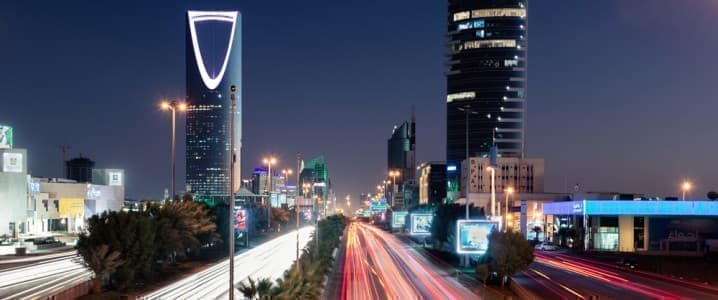Saudi Arabia has big plans to decarbonise its economy through the diversification of its energy sector, investing significantly in clean technologies and introducing commercial-scale carbon capture systems in its oil and gas operations. The Kingdom has already announced a wide range of renewable energy projects and partnerships with other countries to develop its supply chains and energy trade routes. In addition, Saudi Arabia’s oil giant plans to invest heavily in carbon capture technologies to support the decarbonisation of its oil and gas operations.
Over the last few years, Saudi Arabia has announced a whole host of clean energy projects, from massive solar and wind projects to green hydrogen operations. The Kingdom is aiming to derive half of its energy mix from renewable sources by the end of the decade, with a clean energy pipeline of 22.8 GW at present. Around 2.8 GW of this green energy capacity is expected to be operational before the end of the year. Saudi Arabia is also expected to tender a further 8GW of renewable energy projects by the end of the year, according to Muneef Al-Muneef, the general director of renewable energy policies at the Saudi Ministry of Energy.
Most of Saudi Arabia’s green energy projects centre around wind and solar energy. But the Kingdom is also investing heavily in a range of renewable energy sources and clean technologies, from battery storage to pumped hydro storage and geothermal technologies. The government is currently exploring the viability of each energy source in Saudi Arabia to support the development of a diverse mix of clean energy sources. Al-Muneef did highlight some limitations in the expansion of renewable energy operations, stating that due to the global surge in renewable energy projects, the strain on the global supply chain has intensified.
Saudi Arabia is not working alone when it comes to developing its green energy resources, with the government establishing several international partnerships to ensure the Kingdom’s place in the future of the international energy market. This month, Saudi Minister of Energy Prince Abdulaziz bin Salman signed a memorandum of understanding on electrical interconnections, hydrogen, and clean energy supply chains with India. Following this move, the Indian Minister of Power, Raj Kumar Singh, said that the two countries are aiming to become the energy powerhouse of the world.
Singh stated, “We have complementarities and together, both our countries when we have the synergy, I think will be unbeatable.” Prince Abdulaziz stated, “We have a common goal and common objective of being a big producer of green electricity and green hydrogen.” He added, “There is potential for mutual exploitation of the competitiveness of both countries. I honestly believe that by allying with each other, we will be able to give ourselves an even better chance to achieve our aspirations.”
In addition to rapidly developing the country’s renewable energy sources, Saudi Arabia is also investing heavily in clean energy and decarbonisation technologies to support its aim of a green transition. This month, the Saudi oil and gas giant Aramco signed a deal with Siemens to develop a small-scale direct air capture “test unit” to help decarbonise oil and gas operations. The test unit is set to be constructed in Dhahran, Saudi Arabia should be completed in 2024.
Rather than traditional carbon capture and storage (CCS) systems, Aramco is investing in direct air capture (DAC) systems, which extract CO2 from the air. The carbon dioxide is then condensed into solid stone-like formations or liquefied to be stored underground. The technology has taken off in recent years, particularly after the U.S. oil and gas company Occidental Petroleum Corporation announced plans to install a huge DAC structure over 400 square miles of land in Texas and Louisiana, to decarbonise its oil and gas operations. Thanks to its favourable climate policies, the U.S. government is funding up to 45 percent of the project costs and the DoE announced plans to invest up to $1.2 billion in DAC technology.
The project, one of the world’s first commercial-scale DAC developments, is expected to be up and running in 2024. There are currently around 18 DAC plants worldwide, in Europe, the U.S. and Canada, but energy experts have repeatedly stated their scepticism about the technology. This has led many countries to wait and see the outcome of projects currently under development, such as those in the U.S., before they invest in the technology, particularly as DAC systems are more expensive than other CCS technologies.
A spokesperson for Siemens said that, in the case of Aramco, once the test unit is complete the two companies will decide whether to carry out an official pilot phase. A commercial scale-up could follow the pilot phase if successful. Aramco’s CEO, Amin Nasser, previously emphasised that CCS will be vital to meeting Saudi Arabia’s climate goals. Nasser said that the world needs to speed up and scale up carbon capture technology, stating that the world needs “approximately 120 times more assets than what we have today.”
By Felicity Bradstock for Oilprice.com
More Top Reads From Oilprice.com:
- SOCAR And Lukoil Seal Unique Oil Deal Despite Western Sanctions
- Kenya's Ambitious Carbon Capture Plant Sparks Debate
- Russia-China Energy Partnership Faces Uncertainty Over Pipeline Deal


















